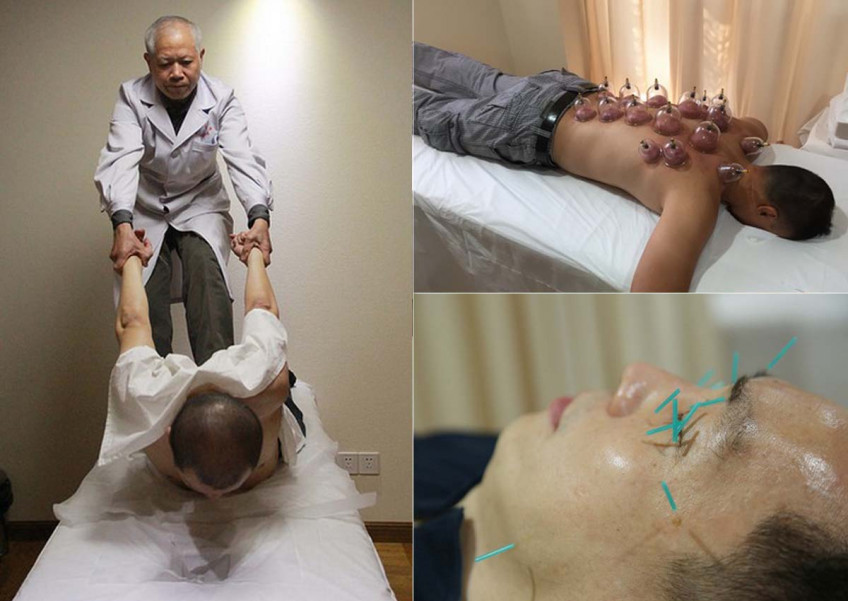5 misconceptions about TCM debunked

In Singapore, Traditional Chinese Medicine (TCM) has always been regarded as an alternative therapy only suitable for the elderly.
Despite a history that spans over 5,000 years, many people still do not consider TCM as their first choice of treatment when they fall ill.
AsiaOne spoke with Dr Zhu Yong Hua, Medical Director of Fullshare Health City, and Dr Zhang Shi Zhong, Dermatology & Weight Loss Specialist, to learn about the five common misconceptions of TCM.
Q: Is TCM only suitable for the elderly?
Dr Zhu: This is a misconception about TCM. It has been around as long as the Chinese culture, which stretches for as far as 5,000 years.
TCM is applicable to everyone, including women and children, regardless of age or gender.
For example, if a child has the flu, fever, diarrhoea, or poor appetite, practitioners can treat the child with "tuina" - a massage technique similar to acupressure. The problem will usually go away after one or two sessions.
Physicians may also use a combination of acupuncture and tuina can to help treat short-sightedness in children.
TCM also has remedies for ailments common among women or men.
The common perception in Singapore is that TCM's emphasis is on enhancing one's health, which leads to the belief that it is only suitable for older people.
But that is not true, as everyone can make use of TCM principles to become healthier.
Q: Is TCM only good for treating sprains?
Dr Zhu: TCM is definitely not limited to just "die da" or bone-setting - a form of treatment for injuries like sprains, bruises and fractures.
TCM has been proven to be very effective at treating trauma and physical injuries, which may have led people in Singapore to think that it is limited to such treatments.
Besides injuries, TCM can also treat modern ailments such as high blood pressure, high cholesterol, and diabetes, as well as respiratory problems like cough, asthma, and bronchitis.
TCM has been found to work very well on ailments related to the digestive system.
Q: Is an older TCM practitioner better?
Dr Zhu: In the past, TCM practitioners in China start their practice by becoming an apprentice when they are young.
However, many TCM practitioners in the country now undergo formal education and systematic training by attending a TCM college for five years.
Most of them are about 23 years old when they graduate. Therefore, an older TCM practitioner is generally more experienced.
However, there are no age restrictions imposed on those who are studying TCM outside China. So, you may find people of different ages studying TCM in places like Singapore, the United States or Europe.
When you encounter an older TCM practitioner outside of China, there is no guarantee that he is an experienced one. In this case, you may want to find out how long he has been practising TCM, instead of trying to judge his experience by his age.
Q: Why is TCM considered not scientific enough?
Dr Zhang: First, I think we have different definitions about what is "scientific".
Frankly speaking, we have yet to fully understand the human body.
Western medicine has been around for about 200 years, while TCM has a history spanning thousands of years.
TCM is experiential as it draws conclusion from experience, whereas Western medicine is more experimental as it concerns itself with statistics. These are two very different approaches to healthcare.
To think that "experiential is less scientific than experimental" is a rather narrow perspective.
In addition, something that we think is correct now (because of scientific reasons) may be proven wrong in the next 10 years or 50 years.
Although TCM does not perform laboratory experiments, but its knowledge has been gathered from over thousands of years of actual medical practice. Therefore, we should not dismiss "experiential knowledge" as unscientific.
Q: Does it take longer to treat the same ailments using TCM methods than Western medicine?
Dr Zhang: People have this misconception probably because they do not fully understand TCM.
It can deliver results quickly, if not quicker, than Western medicine.
Ancient records in China have also documented renowned TCM practitioners curing illnesses with only two doses in the past.
For example, if you were to treat the common flu with TCM, you may get better in a day or two.
Meanwhile, with Western medicine, you will probably be taking medication to combat your symptoms, and may take as long as seven days to recover.
But it is important to note that the flu usually goes away by itself without treatment in about a week's time.
So, although Western medicine can quickly alleviate acute symptoms, it does not treat the cause of the illness.
The same theory applies for those with long-term ailments.
When it comes to treating the underlying cause of the illness, Western medicine may not be any faster compared to TCM, unless you are talking about surgery to remove tumours.
However, let me qualify my statement by saying that there are fewer good, renowned TCM practitioners now.